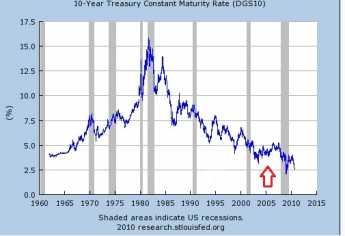Related Topics
Banking Panic 2007-2009 (1)
Mankind hasn't learned how to control sudden wealth, whether in families, third-world countries, or the richest nation in history. The world banking crisis of 2007 is the biggest example yet.
Philadelphia Changes the Nature of Money
Banking changed its fundamentals, on Third Street in Philadelphia, three different times.
August, 2007: Sudden Financial Jolt
 For the moment, the broadly unanticipated behavior of world bond markets remains a conundrum. 
|
| Alan Greenspan, Feb.16, 2005 |
In early August, 2007 the stock market was sailing along nicely. A great many people were on vacation. September is traditionally the month for severe market reversals, but this year in early August there was not much sign of an impending jolt. The stock market's Dow Jones Industrial Average had reached an all-time peak over 14,000. Long term interest rates were abnormally low, it is true, but that anomaly had gone on uneventfully for years; anyway, even Alan Greenspan said he didn't understand it. Suddenly, the Dow Jones Industrial Average dropped 400 points in ten minutes, on heavy volume. It takes a big volume of sales to move the market that much, that quickly. Somebody knows something, but I don't know what it is, was the thought at ten thousand trading desks watching computer screens, worldwide. A quick check with networked friends showed that nobody else seemed to know what was stirring things up, either. In retrospect, we still don't know who did the first heavy selling, but it soon spread to hedge funds. Hedge funds have a lot of money, and vast banks of computers to do their selling. When the computers of heavy traders detect sudden selling volume, they are programmed to sell, too. Don't ask questions; somebody must know something, so get out, get out the door without a backward look. Not only was someone selling big, but probably selling short. The commentators on cable TV started jumping up and down, talking all at once.

|
| Graph: Prices of 10-yr Bonds |
About a day later, someone made a shrewd guess. The problem seemed to center on those low-interest rates for long-term bonds because those low rates were abruptly going higher. In the language of the market, the "spread" between short-term and long term rates was widening or at least returning to normal. Not knowing why the spread had narrowed, no one knew why it had stopped being narrow; but it was nevertheless a clue where the problem might be centered. About a month later, rising interest rates seemed even more central when clues to many other suggested culprits had proved false. The selling concentrated on blue-chip stocks, but there was nothing the matter with blue chips. They had been sold because other markets were frozen with fear; if someone needed cash, there was nothing else the market would buy. The "quants", the traders who programmed computers to react without thinking, had merely reacted in sports jargon, to a 'head fake' in the blue chips. Meanwhile, interest rates continued to spread apart; someone big was selling a lot of long-term bonds, and was really serious about it.

|
| Alan Greenspan |
Come to think of it, if long-term interest rates were returning to normal because someone was selling bonds, then, of course, they had been too low for years because someone else was buying too many bonds. Maybe the Middle East oil barons had a hand in it, but more likely it was the Chinese government, who were known to hold a trillion dollars of U.S. Treasury bonds. Some years ago, Chairman Alan Greenspan of the Federal Reserve worried out loud that by historical standards, public markets [in this case, the Chinese government] were agreeing to accept interest rates for long term debt that seemed much too low for the risks undertaken in loaning it. Worse still, the reasons were unclear. Greenspan called it -- a conundrum. Home mortgages are long term debt, and here's maybe another clue. For political reasons, tax laws had effectively made mortgages the cheapest way to borrow. For another, the reverse mortgage, or home equity loan innovation, transformed home mortgages into the equivalent of ATM machines. A great many young people who might have been better off renting a place to live were persuaded that owning a house was essential to improving 18% credit card interest into 6% mortgages, and tax-sheltered 6% at that. Hidden in this borrowing revolution was the unrecognized temptation to maintain far less owner investment in the house that had been true in the past. It became cheaper to borrow, riskier to loan. American homebuyers were subsidized to borrow, and for whatever reason, Chinese were inclined to lend.
If interest rates go up, the value of bonds with low coupons goes down. Plenty of non-Chinese owned bonds, mainly American banks, and insurance companies. If these bonds had been purchased as long-term investments, there was no sense in selling them, and it was merely annoying that stock market prices for bank and insurance stocks dropped to reflect this lessened value of their holdings. If the banks and insurance companies merely held the bonds to maturity as they had always planned to do, bond values would return to their original price. True, there were rumors that bonds related to California and Florida real estate were in an unsound bubble. But if every one of those bonds became worthless, which was unlikely, it would only amount to $100 billion in losses. That's, of course, a lot of money, but easily absorbed by a big economy. Many of those bonds were insured, and at least half of real estate value is usually recovered in mortgage foreclosure. A lot of people would be inconvenienced by markets frozen with fear, and panic selling of various sorts would make the markets volatile. But this was mainly a liquidity crisis, roughly equivalent to a man with a $20 bill who was temporarily unable to get a candy bar out of a dispensing machine.
Supported by such talk, the stock market went down moderately but steadily. After a year, it was down two thousand points, or perhaps 15%. We seemed likely to have a recession, but periodic recessions are a healthy way to correct irrational exuberance. Most Americans do not own Florida and California real estate, don't use the banks and insurance companies in those regions, and have a reserved opinion about those who do. Somehow, it was overlooked that the very first banks to collapse in this upheaval had been in Germany, France and England.
In retrospect, in 2011 we
Originally published: Tuesday, July 01, 2008; most-recently modified: Monday, May 13, 2019